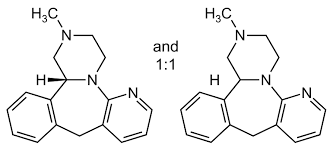Note: This article does not constitute medical advice. Please consult with your doctor before making any decisions regarding your health
While many people have an easier time managing their emotions when they're happy, most experience some form of emotional distress from time to time. Depression can range from mild sadness to extreme feelings of hopelessness and despair.
If you want to try a new medication for depression, but don't like antidepressants that are SSRIs, tricyclics or tetracyclics (like amitriptyline), Mirtazapine may be your best bet.
It's a relatively new antidepressant on the market and is generally considered safe. But does it work better than others?
Medications Prescribed for Depression
The good news is that there are many medications available to help treat these conditions. One popular older class of drugs used to combat depression is called tricyclics -- this group includes such well-known examples as Elavil, Norpramin, Tofranil, and Desipramine.
Another type is called tetracyclics, which include maprotiline among its members. While both classes of compounds have been proven effective against severe cases of clinical depression, each has side effects that make them less attractive to patients who need relief.
For example, those using tricyclics must limit alcohol consumption because the two substances interact badly together.
That brings us to another problem associated with taking antidepressants containing either tricyclics or tetracyclics, they typically take several weeks before showing significant positive results.
This delay makes sense since the drug works by slowly altering levels of neurotransmitters in the brain.
As a result, if someone takes an antidepressant, they could end up feeling nauseated, dizzy, or even intoxicated. To avoid this unpleasant scenario, doctors usually prescribe SSRIs (selective serotonergic reuptake inhibitors) instead.
These types of antidepressants increase the amount of free-floating serotonin in our brains, which means we feel more relaxed almost immediately. However, the downside is that SSRIs carry the risk of heart attack, stroke, high blood pressure, and liver damage, just to name a few health problems.
Development of Mirtazapine
Because of the risks involved with older antidepressants, researchers began looking into alternatives. In 1998, one company was awarded U.S. Food & Drug Administration’s approval to market Mirtazapine as a treatment. Soon afterwards, Mirtazapine became marketed under the brand name Remeron.
Unlike traditional antidepressants, Mirtazapine doesn't alter how fast neurotransmitter molecules travel between neurons within the brain. Instead, it blocks receptors where certain chemicals act upon nerve cells.
Because Mirtazapine isn't designed to stimulate the release of mood-elevating neurohormones, scientists theorise that it should produce fewer adverse reactions than other antidepressants.
And so far, studies seem to support this claim. On top of being safer, Mirtazapine appears to provide quick relief from symptoms of major depressive disorder compared to other treatments.
The following text discusses what exactly Mirtazapine is, whether it's the safest antidepressant out there and any possible side effects of the compound.
We'll find out why Mirtazapine might not affect memory too much and explore other uses for the drug beyond treating mental illness.
Mechanism of Action
The drug seems to function best when paired with therapy sessions aimed at learning coping skills, practising relaxation techniques, and talking through difficult issues related to past trauma.
Additionally, unlike selective serotonin reuptake inhibitors, Mirtazapine actually prevents a chemical called GTP Cyclohydrolase 1 from producing a molecule known as tetrahydrobiopterin.
Without a supply of tetrahydrobiopterin, histamine cannot be produced. Histamines cause inflammation and allergic responses in the body, while lowering levels helps reduce itching caused by allergies and eczema.
What’s truly amazing about Mirtazapine is how fast it acts after the intake i.e within 3 hours.
In short, it looks like Mirtazapine is responsible for an antihistamine effect similar to that commonly seen in cold medicines.
Now, we'll look at the safety profile of Mirtazapine.
How Safe is Mirtazapine?
Despite having fewer negative side effects than tricyclics and tetracyclics, none of Mirtazapine's potential risks has been conclusively linked to the drug itself. Still, caution should always prevail when dealing with any medicine.
Before beginning treatment with Mirtazapine, check with your doctor about existing medical ailments and current prescriptions.
Also, if you know that you are pregnant, plan accordingly. Pregnancy requires special care due to the fact that Mirtazapine crosses the placenta barrier easily.
Even though Mirtazapine carries no documented link to birth defects, women shouldn't use the drug without first consulting their psychiatrist, and/or obstetrician/gynaecologist.
Safest Antidepressant?
Yes, Mirtazapine is believed to be safer than other antidepressants currently on the market. Most experts agree that Mirtazapine offers a lower chance of causing cardiovascular complications, including arrhythmias and hypertension.
In addition, only minor weight gain has been reported as a common side effect of the drug. Finally, Mirtazapine seems relatively safe when mixed with alcohol. By contrast, mixing SSRIs with alcohol may cause dangerous changes in behaviour and coordination.
Still, Mirtazapine's lack of serious side effects hasn't stopped every patient from experiencing discomfort during their stay on the drug. Some complaints of dry mouth, nausea, insomnia and vivid dreams resemble nightmares.
Others report headaches, drowsiness, muscle pain, and fatigue. Many users report that these side effects disappear over time. Still, patients should talk to their physician immediately if they begin noticing unusual symptoms.
As mentioned earlier, Mirtazapine doesn't interfere with normal bodily functions involving the release of dopamine, adrenaline, and noradrenaline. Consequently, it shouldn't impact memory function.
Studies show that Mirtazapine does appear to enhance motor reflexes slightly, although it remains debatable whether this affects overall cognitive ability.
Experts aren't sure whether Mirtazapine enhances cognition in general or simply improves alertness and focus.
It's important to note that the majority of evidence supporting Mirtazapine's benefits comes from animal studies.
Clinical trials haven't fully determined whether the drug provides therapeutic value for humans suffering from various neurological disorders. Only time will tell whether Mirtazapine really does offer a healthier alternative to existing antidepressants.
Side Effects of Mirtazapine
One advantage of Mirtazapine is its relative ease with which it interacts with other prescription drugs and nonprescription products.
According to information provided by the manufacturer, taking Mirtazapine along with aspirin, warfarin, loratadine, cimetidine, or clarithromycin increases the chances of bleeding problems.
Drinking alcohol while taking Mirtazapine can lead to sedation and impaired balance. Although rare, interactions have occurred when Mirtazapine has been combined with barbiturates, benzodiazepines, calcium channel blockers, methadone, primidone, rifampin, terfenadine and grapefruit juice.
Patients should consult their physicians before combining Mirtazapine with any other product, especially herbal supplements.
Now that you have all perspectives, it is for you and your doctor to decide whether Mirtazapine should be your go-to antidepressant or not.


